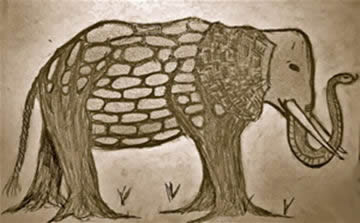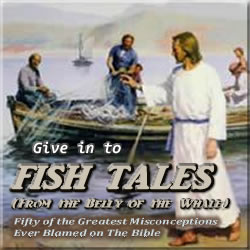A Great Divide
Blind Men and Wandering Elephants
In a world besieged by confusion and doubt, people naturally cling to every vestige of truth available to them. Unfortunately, the definition of truth seems to differ according to which half of the world one happens to be born into. To the Western mind, truth—synonymous with knowledge—is a straightforward collection of physical evidence, primarily collected through empirical means, characterized by strict observation and systematic analysis. But according to the Eastern mind, truth—more at wisdom—is never so obvious and matter-of-fact. In their view, truth is ephemeral, shifting, virtually meaningless. Whereas the Western mind sees truth as verifiably objective and capable of being codified, the Eastern mind insists that truth is merely subjective and beyond the pale of comprehension.
From its earliest days, the Western mind has been dominated by what is known as Aristotelian logic, named after the ancient Greek philosopher Aristotle, a dialectic process typified by sequential cognitive thinking in the form of “if” this, “then” that. In short, if such and such a thing is determined to be true, then something else, as an extension of this original thing, can be confirmed as being just as true. Eventually, this Western point of view gave birth to the celestial mechanics of Isaac Newton, with its emphasis on cause and effect, famously embodied in his landmark theory of universal gravity. Most famous among his laws is the third which states: To every action there is an equal and opposite reaction. Boiled down to its most basic terms, the reality that Newton expressed was one that above all behaved in logical and sequential terms. Eventually came the work of Albert Einstein, which continued in the tradition of his predecessors, yet ultimately took it to the next level, as described in his theories of both general and special relativity. Almost overnight, Einstein’s work revolutionized prior notions of motion, time, and space, yet, in the final analysis, these varied scientific worldviews, whether they were characterized by Aristotelian logic, Newtonian mechanics, or Einsteinian physics, all still represented fundamentally similar forms of describing the nature of reality in positivistic terms.
Story Continues Below
To watch author and historian W. Kent Smith discuss the contents of his book On Earth as It is On Heaven, at the Sacred Word Revealed Conference ’23, hosted by Zen Garcia, CLICK BELOW.
Story Continues From Above
In contradistinction to this Western, scientific view of reality stands the Eastern, philosophic view, which is characterized by a rejection of rationalism, and which instead embraces existentialism. In short, the seeds of Eastern thought began with an inherent distrust of rational thought as a means of discovering truth and focused on the subjective nature of existence in relation to a personal, idiosyncratic pursuit of knowledge. According to this worldview, one’s ultimate goal in life is liberation and freedom from the rational, objective self, and to this end the seeker is encouraged to follow one’s own unique instincts, intuitions, and passions. Based on this philosophical frame of reference, “knowing” is synonymous with “being.” Beginning with the ancient Chinese philosopher Confucius, the pursuit of truth, then, was more a pursuit in regards to ethics as opposed to specific laws of the Universe, so that the acquisition of wisdom meant developing one’s sense of what it means to be “human,” and as such it was primarily concerned with establishing an ethical, social fabric, centered on such ideals as honesty and sincerity, as opposed to living one’s life according to a set of divinely ordained rules and regulations. In a similar vein, it is said that Gautama Buddha was just as suspicious of the rational mind, which he believed was the source of all suffering as a by-product of its own reasoning process. Only when the individual could free itself from the self’s craving for sensuality and power could one achieve nirvana, a state of supreme liberation. To this end, the Buddha rejected any notion of the infallibility of Scripture, believing that only teaching borne out of one’s own experience could be relied upon.
So, considering such contradictory presuppositions of the nature of reality, what can we say about what is and is not true about the world? With such polarizing views of the same reality, how can we ever hope to believe anything at all? And could the nature of truth really be so dependent upon the act of perception by the one who perceives it? After all, even if no one was around to “perceive” the Universe, wouldn’t the Universe still “be” what it is? Am I really the only person to ever think that no matter how much someone thinks they “understand” the nature of reality, that in the end the Universe will never “be” something it is not? Naturally, the Universe will simply function in the same way it always has and always will function, no matter what we think to the contrary, right? How else could it be any other way? As if, for example, you or I could ever affect the life a person who lived and died clear across the other side of the globe simply because of what we thought or said about that person.
Don’t get me wrong; I’m not here trying to negate the importance of philosophy. This website is, after all, dedicated to the pursuit of philosophical endeavors. But what I am trying to say is that after so many centuries of heated debate about “what” constitutes “what” in terms of the nature of reality, can’t we ever as a species of thinking creatures come to some sort of truce in the war on knowledge? In other words, instead of harping on the differences in our inherited worldviews, when will we simply accept the truth that is so eloquently illustrated in the timeless tale of the three blind men who were confronted with the “reality” of the legendary elephant? You all remember the story of how the first blind man got hold of the elephant’s trunk and exclaimed that what they were dealing with was a snake, while the second blind man who felt along its leg insisted they had found a tree, and finally how the third blind man who was handling the elephant’s tail confidently concluded that they had come upon a rope. One reality—an elephant—was being, quite naturally and understandably, viewed as three separate “realities,” all as a result of the three different perspectives of the three blind men. What an ingenious way to describe the human dilemma, and one that serves as a perfect illustration for the purpose of this website, which is so dedicated to the all-too-human pursuit of truth.
So rather than continue the ages-long attack on this or that ideology, all in the name of right thinking, why not focus on the common denominators among them all? Instead of thinking of reality in terms of a multi-fractured world, both familiar and foreign, depending on which side of the fence you happen to live on, why not accept, once and all, that there can only be one ultimate reality—though unknowable in its entirety—as illustrated by the single elephant of the preceding story. And though there are many versions of this lone elephant by virtue of our blind groping of the same beast, there is no cause for us to further wage war simply for the sake of enshrining our own pet theories, because in the final analysis, each and every one of our cherished worldviews is merely a single aspect of the same extended reality, that is, one “known” slice of reality which makes up one of the myriad aspects of a much larger reality. What a revelation that would be; what a miracle indeed, don’t you think?
Still I can hear some of you saying, “But beware, my friend, the road you’re asking us to take! Because once you venture down that path of compromise, then you’ll surely fall into the trap of watering down the truth until what we now revere as true wisdom will no longer be indistinguishable from mere opinion, when what people need are answers they can hang their hats on. Right?” To which I’m sure the God of the Snake, the God of the Tree, and the God of the Rope would have no problem in responding with a hearty: “I’ll take the risk.”






